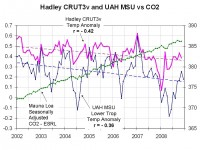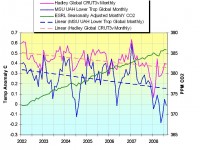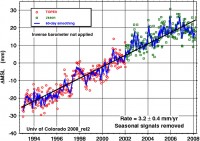Edited David Alexander and Chris Wilson, Reuters
Republican presidential candidate John McCain on Thursday listed investor Warren Buffett and former eBay chief Meg Whitman as potential Treasury secretaries in his administration but declined to say if he would consider asking current Secretary Henry Paulson to stay.
McCain noted in an interview with Reuters that Federal Re serve Chairman Ben Bernanke had a “set term” and as president he would decide whether to reappoint Bernanke based on economic conditions at the time. The U.S. financial crisis and $700 billion Wall Street bailout bill in Congress has heightened interest in who would steer Treasury in the next administration.
“I think it would be someone that Americans would recognize that would inspire trust and confidence,” the Arizona senator said. “There’s people like (Cisco chief executive) John Chambers, there’s people like Meg Whitman, there’s people like Warren Buffett,” he continued, adding that these people could serve in one of many jobs that would need to be filled.
McCain said he would choose a Republican or Democrat who is highly respected to lead the department. Buffett, 78, who McCain admitted may not be interested in the job because of his age or other factors, has endorsed Democratic presidential candidate Barack Obama.
When asked about Bernanke’s performance during the U.S. financial crisis, McCain said: “He has a set term, so I certainly would have to look again at the overall situation as it exists at the time when I would be making those selections, but the fact is that he is in a term of office.” McCain said he had great respect for the Fed chair.
Asked if he would be a visible presence in international talks to reduce greenhouse gas emissions and replace the Kyoto Protocol, McCain, who has clashed with fellow Republicans over climate change, said he would do “whatever is necessary to try to move forward.”
He said he would involve former Vice President Al Gore in efforts to address the issue. “I would tap him, I would tap people who have been involved in these issues for many years.” McCain noted that he disagreed with the Nobel Peace Prize winner about nuclear energy but added, “I have great respect for Al Gore.” Read more here.
By Michelle Nichols, Reuters
Nobel Peace Prize winner and environmental crusader Al Gore urged young people on Wednesday to engage in civil disobedience to stop the construction of coal plants without the ability to store carbon.
The former U.S. vice president, whose climate change documentary “An Inconvenient Truth” won an Academy Award, told a philanthropic meeting in New York City that “the world has lost ground to the climate crisis.” “If you’re a young person looking at the future of this planet and looking at what is being done right now, and not done, I believe we have reached the stage where it is time for civil disobedience to prevent the construction of new coal plants that do not have carbon capture and sequestration,” Gore told the Clinton Global Initiative gathering to loud applause.
“I believe for a carbon company to spend money convincing the stock-buying public that the risk from the global climate crisis is not that great represents a form of stock fraud because they are misrepresenting a material fact,” he said. “I hope these state attorney generals around the country will take some action on that.” The government says about 28 coal plants are under construction in the United States. Another 20 projects have permits or are near the start of construction.

Scientists say carbon gases from burning fossil fuel for power and transport are a key factor in global warming. Carbon capture and storage could give coal power an extended lease on life by keeping power plants’ greenhouse gas emissions out of the atmosphere and easing climate change. But no commercial-scale project exists anywhere to demonstrate the technology, partly because it is expected to increase up-front capital costs by an additional 50 percent. Read more here.
ICECAP Reality Check:
Temperature changes US last 115 years show cooling in 5 of the last 7 decades starting the post WWII boom.

Data sets in last 7 years shows cooling which again bucks increasing CO2

Sea levels have levelled off/fallen last two years as the oceans have cooled and contracted.

The sun is the quietest it has been in at least 100 years (possibly since the late 1700s and early 1800s). NASA this weeek reported te solar wind was the weakest in the satellite era. The Pacific Decadal Oscillation reached its coldest level recorded this summer and another La Nina is likely on the way. While the earth cools, Gore and his environmental friends are blocking access to the energy we need.
By Michelle D. Bernard, The Examiner
A certain moral vanity infuses the environmental movement. It demands drastic action to prevent possible warming a century away, but offers little or no hope to those starving or dying of AIDS today. Protecting the planet is important. However, we must never forget that humankind is at the center of God’s creation. Climate change is horribly complicated. There has been warming over the last century, but not the last decade. New studies suggest that temperatures may actually cool through 2015. Knowledgeable scientists disagree over how much warming is due to human action and how much is due to natural factors.
Most important, we really don’t know how much warming is likely to occur in the future. Imagine trying in 1900 to predict the world of 2000. We can do no better today looking ahead to 2100. Even small changes in assumptions could invalidate predictions of warming in coming years, let alone decades. If it were easy to do, then we could dramatically cut CO2 emissions just to be sure. But carbon-based fuels - coal, natural gas, and oil - make up 85 percent of America’s energy supplies.
Never mind years of research and billions spent on alternative fuels. Renewable sources of energy accounted for just 7 percent of America’s total energy consumption last year. The share due to wind, solar and geothermal power barely registers. That’s not going to change anytime soon. Energy is what makes our economy run. It’s how we fuel our cars and planes, heat and cool our homes, run our factories and produce the goods and services that turned a life of misery into one of plenty. Slashing CO2 emissions means slashing energy use, and slashing energy use means slashing economic growth.
One of the so-called “cap and trade” measures recently advanced in the Senate called for a 70 percent cut in emissions by 2050. The result of this sort of legislation would be dramatically higher energy prices. Forget $4 per gallon gasoline. Think twice that and more. Looking at it another way, the Congressional Budget Office predicted that this approach could raise an average household’s annual energy costs by $1,300. That’s the same as the government imposing a $1 trillion tax on the economy. The economic consequences of such a price shock would be huge. Manufacturing would be hurt the most. Analysts predict job losses in the hundreds of thousands or even millions.
Today’s gross domestic product runs about $14 trillion, but the Environmental Protection Agency figures the legislation debated by the Senate could cut our economy’s output up to $1 trillion in 2030 and $2.8 trillion in 2050. The accumulated losses would be staggering. Incurring this kind of cost could be justified if it was the only means to save the Earth from disaster. But estimates suggest these economy-wrecking efforts would ultimately only prevent 0.013 degrees (Celsius) in warming. In other words, it would have no meaningful effect on our climate.
The poor would suffer the most. If we drain trillions of dollars out of the economy, it is the poor who find it hard, if not impossible, to buy a home, educate their kids, buy gas, put food on the table, get needed health care and more. Any money spent to try to prevent temperatures from rising generates an “opportunity cost,” that is, we are missing out on putting that money to another use. Think of America’s great needs. Poverty still exists, even amid plenty. Our educational system is abysmal, failing to educate many children morally to be good citizens and economically to participate in the global economy. There is infrastructure to be built and investment to be made. Every dollar spent to preclude a temperature increase that might never occur is a dollar not available to help a needy person today. And opportunity costs run global.
Danish environmentalist Bjorn Lomborg organized the Copenhagen Consensus, which brought together experts to debate how best to spend $75 billion to help the world’s poor. Top of the list were vitamin supplements for children. Second was freer trade. Third were mineral supplements for kids. Fourth was expanded immunization for the young. And so it went -food and education aid, women’s programs and health care. The first global warming initiative checked in at only number 14: Research and development spending on low-carbon energy technologies. Mitigation, that is, cutting energy use to reduce temperatures, came in at 29 (when supplemented with R&D) and 30 (when considered alone). That is, there are 13 better ways to save lives and improve people’ standard of living than to do anything about global warming. The latter might be a problem, but it isn’t the most important problem facing us. It isn’t even among the top dozen. Of course, if temperatures rise significantly, there will be consequences, but the most cost-effective way of dealing with them will be to adapt. That’s what we did in past centuries as the Earth warmed and cooled. It’s what we should do in the future in similar circumstances.
The Nobel laureate Milton Friedman told us there is no such thing as a free lunch; he was right. Politics is about trade-offs, and spending ourselves poor in an attempt to deal with uncertain climate problems in the future will cost our society, and particularly its most vulnerable members, far too much today. Protecting the environment requires that we first protect the people in it. Read full report here.


